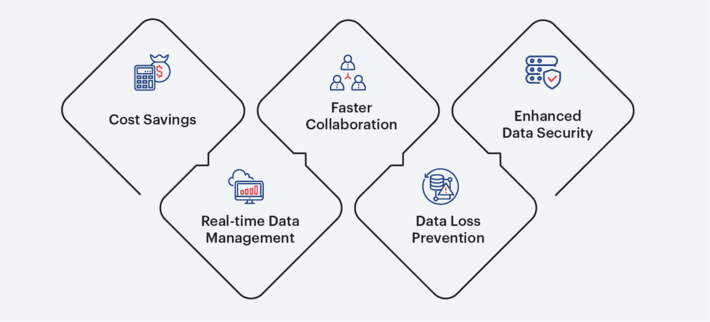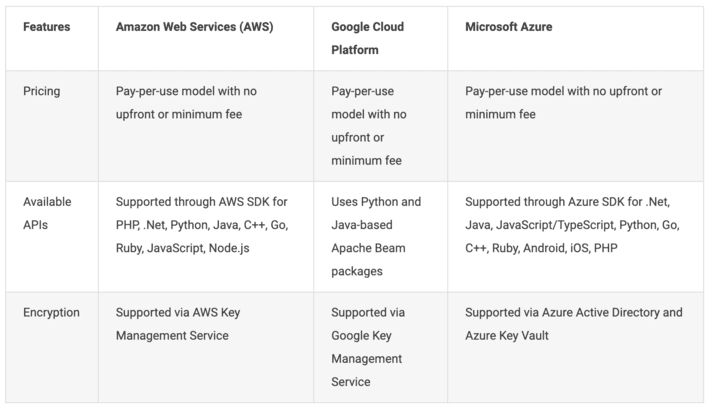
The number of devices connected through the Internet of Things (IoT) is increasing rapidly. Statista estimates that there will be about 50 million IoT-connected devices in use across the world by 2030. And these interconnected devices and enterprise systems will generate vast amounts of data. And, most of this data will be stored and analyzed on the cloud.The number of devices connected through the Internet of Things (IoT) is increasing rapidly. Statista estimates that there will be about 50 million IoT-connected devices in use across the world by 2030. And these interconnected devices and enterprise systems will generate vast amounts of data. And, most of this data will be stored and analyzed on the cloud.
The cloud offers access to different computing services like servers, databases, data analytics, software, artificial intelligence, and others. It allows businesses to run their applications and store data on the best datacenters within reasonable costs. This helps them to simplify and accelerate their data science initiatives. And since data storage and analysis are among the top priorities of all organizations, combining data science and cloud computing techniques can help drive more revenue.
Empowering Data Science with Cloud Computing
Traditionally companies stored their data in local servers before the advent of cloud computing. Data scientists and engineers had to transfer the data from the central servers to their systems every time they wanted to perform data analysis. The process was extremely complicated and time-consuming as data analysis requires collecting and segregating huge volumes of data. Moreover, creating and managing on-premise servers can be very expensive. They require continuous maintenance and backups to prevent data loss. Companies can also end up having too many or fewer servers to fulfill their data requirements. This is where cloud computing help save companies from the hassles of physical servers.
By hosting their data on the cloud, companies can leverage the cloud server architecture based on their needs. They can also save money by leveraging the cloud’s pay-per-use model.
Cloud computing has democratized data. Both small and large companies can perform data analytics without the costs associated with servers and storage. It has also simplified data management and data analytics for data scientists. Cloud computing enables data scientists to take advantage of the easily accessible data and focus on analyzing data, testing hypothesis and developing robust machine learning (ML) capabilities.
Creating Value with the Cloud
A report forecasts that the global cloud computing market size will reach $832.1 billion by 2025, up from $371.4 billion in 2020. This comes as no surprise as cloud data centers are expected to process 94% of workloads by 2021. And since cloud computing and data science are essentially interlinked, there are multiple advantages of embracing the cloud for data science and ML projects. Here are five top benefits:
Cost Savings: Most cloud computing services have a pay-per-use model. This eliminates the need to pay for data storage space or features that companies do not need or want. For example, when a company experiences an increase/decrease in its ML or data science workloads, it can simply scale up or down its cloud server usage and pay accordingly. But if a company wants to scale its on-premise server, it will have to purchase expensive hardware. Thus, using cloud computing can result in significant cost savings.
Real-time Data Management: By storing data in the cloud, companies can eliminate any delay in the data flow. The cloud works as a centralized and accessible platform that enables data scientists to flexibly manage multi-structured data in real time.
Faster Collaboration: Cloud computing enables faster collaboration. Data scientists and engineers can easily view, share and process data across a cloud-based platform. With cloud collaboration, they can provide input and real-time updates from anywhere, at any time.
Data Loss Prevention: Some companies store all of their data on local servers/hardware. In case these local servers/hardware malfunction, these companies might end up permanently losing their valuable corporate data. But with cloud servers, all the data gets securely stored in the cloud. This data can be easily accessed from any smart device with an internet connection.
Enhanced Data Security: RapidScale claims that 57% of companies believe cloud provides better data security than their legacy systems. In fact, over 50% of companies store confidential and sensitive data in the cloud. The data transmitted over networks and stored in the cloud is encrypted. This encryption makes the data inaccessible to hackers.
Leading Cloud Computing Platforms for Data Science
According to Kaggle’s 2020 Machine Learning and Data Science Survey, 83% of surveyed data scientists are using the cloud. The most popular cloud computing players include Amazon Web Services, Google Cloud Platform and Microsoft Azure. Other players in contention are IBM Cloud, Oracle Cloud, VMware Cloud and Salesforce cloud. Here, we have profiled the top players:
Amazon Web Services
Launched in 2006, Amazon Web Services is currently the most popular cloud computing platform in the market. Data from Synergy Research Group shows that Amazon Web Services’ market share in the global cloud infrastructure market was 32% in the last quarter of 2020 (Q4/2020). The platform has various products for databases, including Amazon DynamoDB and Amazon Aurora. It also has products for data analytics, including Amazon RedShift, AWS Data Pipeline, Amazon QuickSight and Amazon EMR. Amazon Web Services possesses comprehensive security capabilities and rich controls.
Google Cloud Platform
Launched in 2008, Google Cloud Platform provides cloud computing services that operate on the same infrastructure that Google utilizes for its products such as Google Search, Gmail and YouTube. It has a number of products for data analytics, including BigQuery, Dataproc, Dataflow and Google Data Studio. Google Cloud Platform can help data scientists seamlessly develop, test and deploy ML models and collaborate on their improvement.
Microsoft Azure
In 2010, Microsoft Azure was launched as a cloud computing platform for data analytics and data science. It offers support for databases through its products including Azure SQL Database and Azure Cosmos DB. It also has products for data analytics, including Azure Synapse Analytics, Azure Data Factory, Azure Stream Analytics and Azure Data Lake Storage. This platform ensures that data scientists and engineers can enjoy easy predictive data mining. According to the aforementioned Synergy Research Group data, Microsoft Azure had 20% of the global cloud infrastructure market in Q4/2020.

Accelerating Data Science with the Cloud
As companies continue to speed up their digital transformation initiatives to remain competitive, it is also important to empower their data science capabilities with cloud computing. Data science is not just about processing data. It requires a robust infrastructure to ingest data and data scientists to build predictive models based on insights. Adding cloud computing to this framework can work like magic. It can significantly simplify the data science process and help a business transform and achieve its goals.
About the author
Bhaskar Ammu is a Senior Data Scientist at Sigmoid. He specializes in designing data science solutions for clients, building database architectures, and managing projects and teams.
